Anker Nebula Solar review: a respectable mid-range projector
The Nebula Solar offers a large 1080p projection for an affordable price, making it ideal for watching films on a big screen
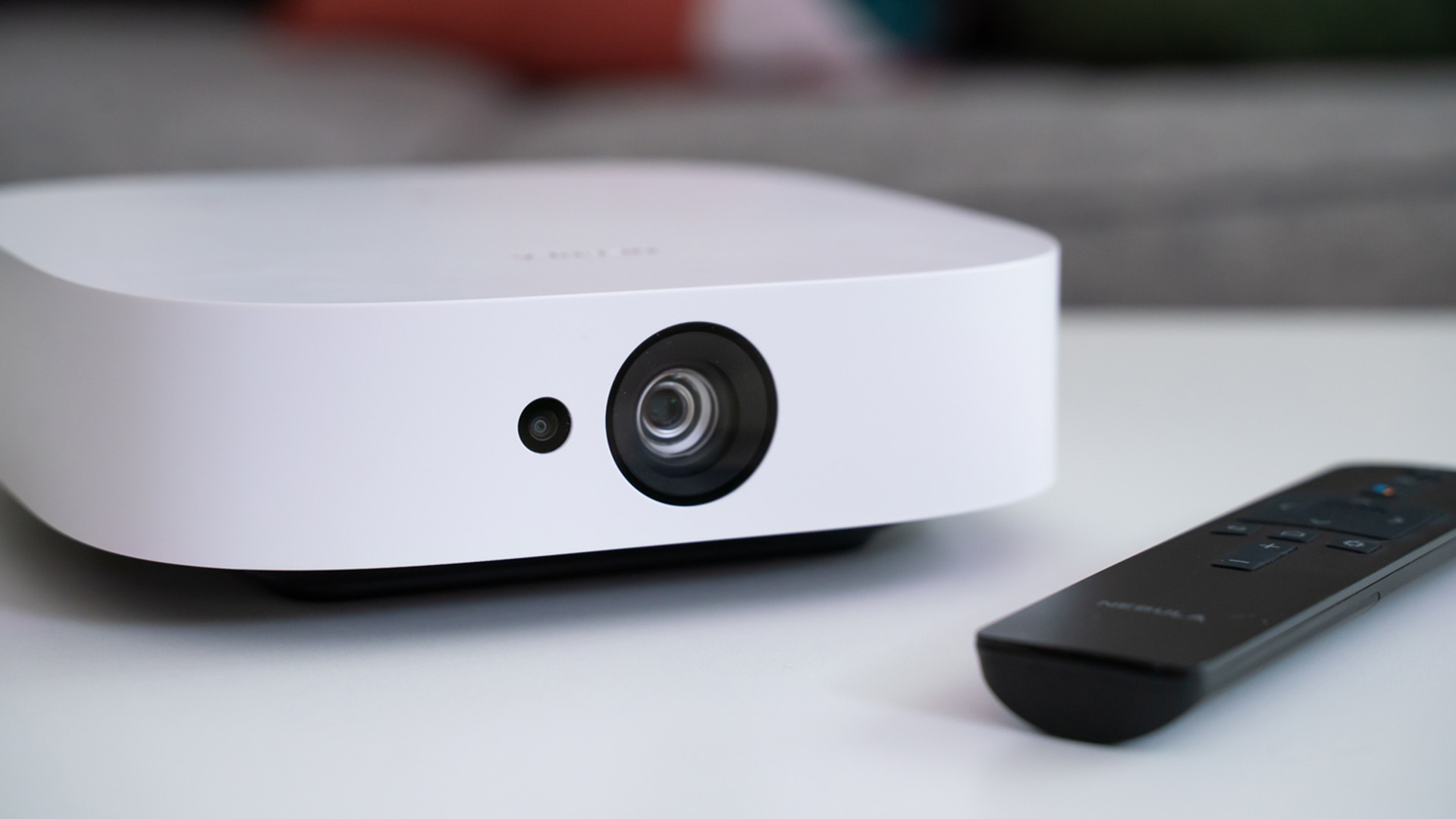
Portability meets affordability in the Nebula Solar, a smart projector offering that is cheaper than the competition and whose sacrifices for the price don’t make that big of a difference. Its biggest drawback is that it might not be bright enough, but only for the most discerning viewers.
-
+
The pancake design makes it travel-friendly
-
+
Easy to use thanks to Android TV 9.0
-
+
Sharp, clean image
-
+
Up to 120-inch projection
-
-
400 ANSI lumen brightness might not be bright enough for some
-
-
No battery built-in
-
-
Speakers are disappointing
-
-
Not the fastest
Why you can trust T3

The Nebula Solar from Anker is a mid-range product in the range. There are cheaper options, such as the Capsule and Apollo but also more advanced models such as the Cosmos and Cosmos Max. Slightly confusingly, there are other models that cost around the same price, too. The Solar Portable adds a rechargeable battery, for outdoor use at the same cost, while the Mars II is slightly brighter but only 720p for only $50 more.
It’s not hard to see the similarities between the Nebula Solar from Anker and the Xgimi Elfin. Both sitting at the mid-range, price-wise, these two portable projectors offer 1080p resolution, have a square pancake-like form factor that’s compact and lightweight, and come in a modern white package. They even have similar limitations. Both have no battery built-in, which somewhat puts a damper on their travel-friendliness, and have speakers that are, at best, average. The difference being that the Solar is considerably cheaper.
Not that the best projectors are not worth splurging on, but why pay more when you’re not overly particular about your viewing experience? The Nebula Solar will more than meet your expectations, whether you’re looking for a TV alternative in your bedroom, something to stream on when camping, or a portable solution for your nomadic lifestyle.
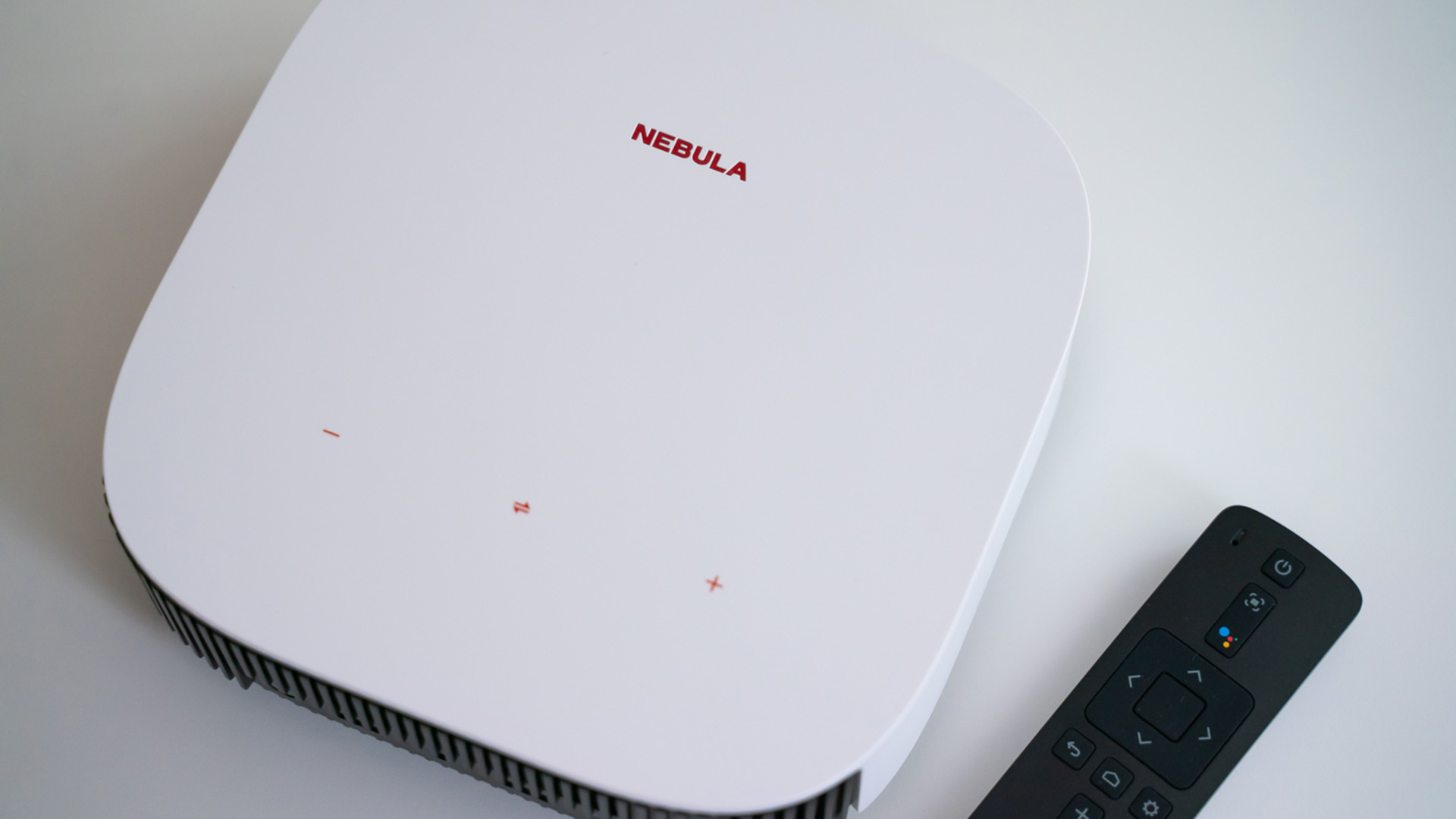
Anker Nebula Solar review: price and release date
The Nebula Solar is not new, having hit the shelves back in June 2020 when mini and portable projectors were only starting to become a thing. However, it’s just as relevant today and can easily hold its own against the newer wave of smart projectors – including its direct rival, the Xgimi Elfin, which followed it about a year later.
But, whereas Xgimi Elfin’s price of entry will set you back around $649/£649/AU$970, you can pick up the Nebula Solar for around $499/£450/AU$750, which makes it the more affordable choice. It’s worth noting though that the Solar is currently showing as sold out in the UK and Australia.
There aren’t a lot of accessories you can buy for the Nebula Solar. However, the Anker Nebula’s 100-inch projector screen pairs nicely with this projector. For only $199 more, this remote-controlled screen should elevate your viewing experience. There’s a $79 portable projector stand on hand as well, if you’re traveling and don’t have anything solid to secure the projector on. Neither of these are available in the UK and Australia sadly.
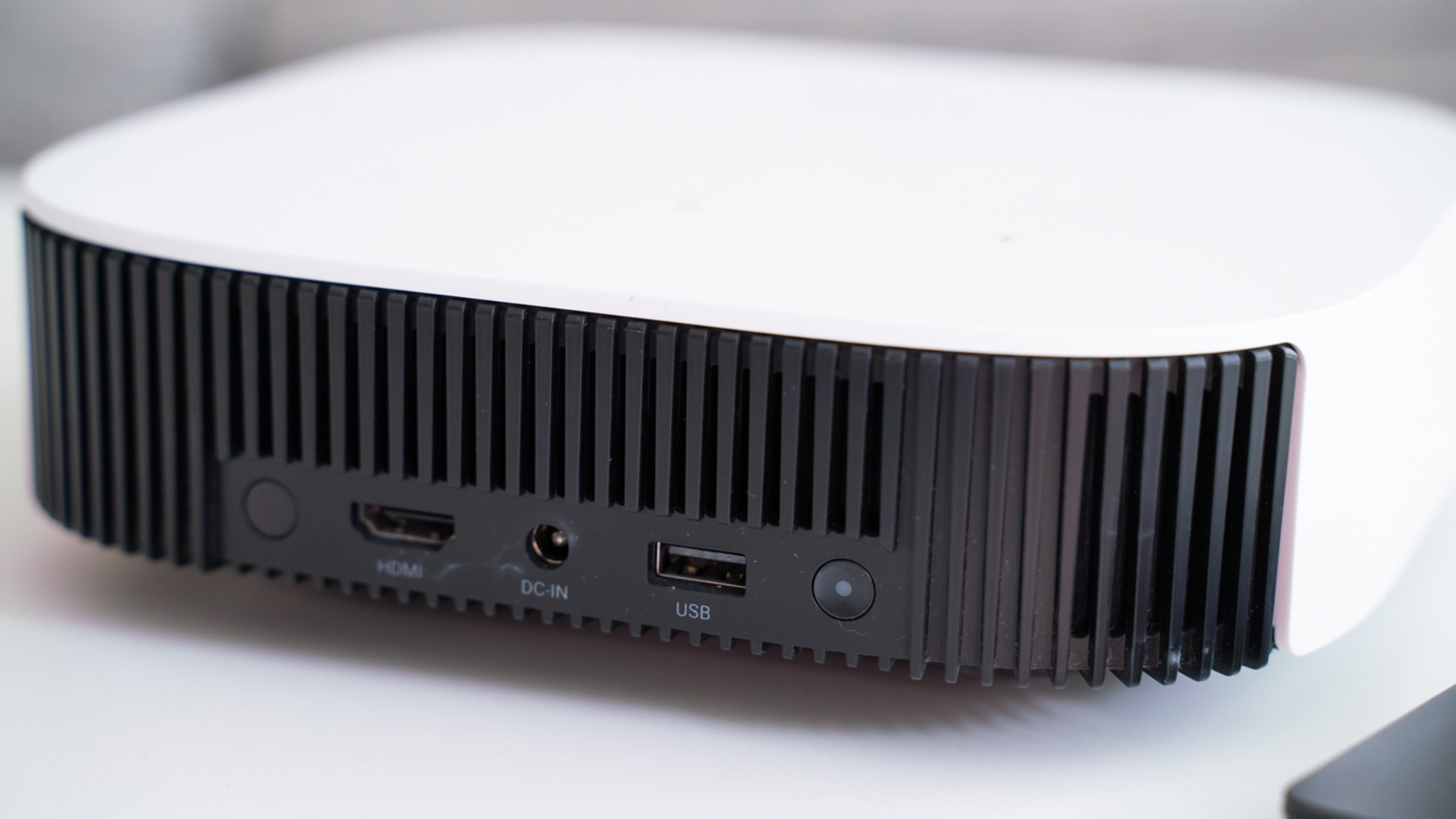
Anker Nebula Solar review: design
The Nebula Solar might not be what you’d consider a mini projector, but it certainly falls in the realm of portable. At 192.25 x 192 x 58.65mm (7.6 x 7.6 x 2.3in) and 1.0kg (2.21lbs), it fits right inside a small backpack or a tote bag. It will certainly fit inside a travel bag if you’re looking for something to take with you on luggage-worthy trips.
Get all the latest news, reviews, deals and buying guides on gorgeous tech, home and active products from the T3 experts
Its pancake-like design also makes transporting it easy. Unlike some of the chunkier smart projectors, the Solar is less than three inches thick, which makes it effortless to stow just about anywhere. Of course, that flat, low-profile design makes it much more stable as well. Even if you set this on a somewhat flimsy surface, you don’t really have to worry much about wobbles and constant auto-focus adjustments – something that a cube or soda can mini projector is prone to.
Meanwhile, the two rubber feet and front rubber pad, which also moonlights as the built-in stand, keep it in place especially on shiny surfaces. The rubber pad stand, which can prop up to 13 degrees, is impressive for something so simple, as it allows for uncomplicated adjustments on the projected image. It also feels robust and has enough resistance to prevent collapse. There’s a 1/4-inch tripod female thread underneath if you want to mount it on a stand or tripod instead.
Back to the projector, it comes in a matte white casing with black trimmings in the back and underneath. There’s a red Nebula logo on the top. Beneath that are three touch buttons for volume and mode switch.
Look for the power button in the back, next to the HDMI 2.0, USB-A and DC-in ports. I know the placement of the power button seems a little out of the way, but you only really need to use it once – when you turn the projector on for the first time. Once you have the remote setup and paired, you can use the remote to turn it on/off. Sadly, there’s no 3.5mm jack or optical audio port. You’ll have to rely on Bluetooth to connect your speakers. Luckily, Bluetooth connectivity on this is more than reliable.
If you’re obsessive about keeping your devices clean, know that the chassis tends to track fingerprints. The good news is that they’re easy to wipe off.
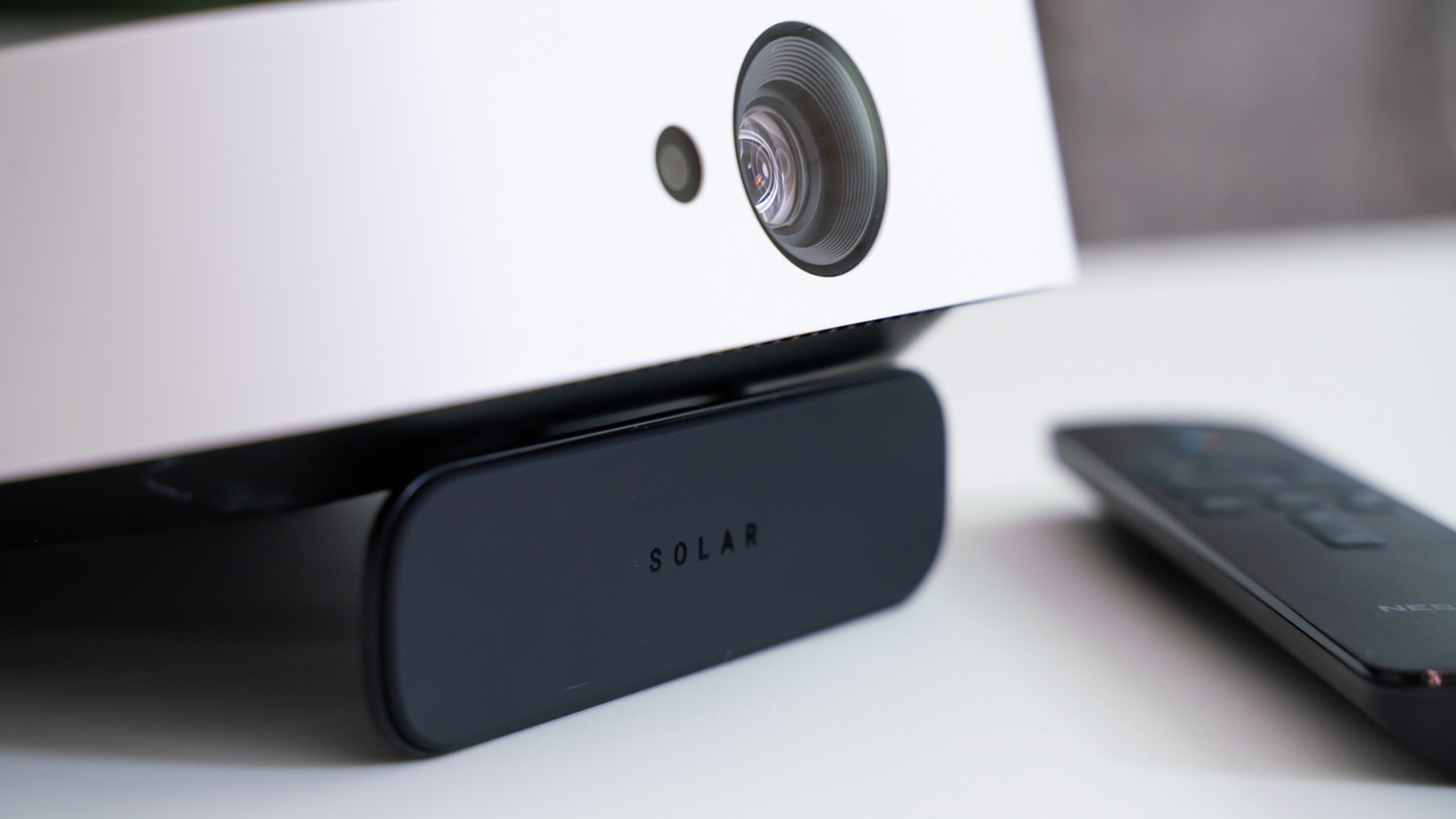
Anker Nebula Solar review: features
You might not find a lot of premium extras on the Nebula Solar, but it does come with more than enough of features to improve ease of use, as well as one surprising one you won’t find in other projectors.
This portable projector can function as a portable Bluetooth speaker, thanks to its Bluetooth speaker mode. Easy to activate and connect, this particular feature lets you play music, podcasts and other audio media through the projector from your phone or tablet. This means that you essentially have two devices in one here – a boon to those who like to travel light. Just don’t expect dynamic sound, but I’ll get to the audio quality in the next section.
As far as essentials, the Nebula Solar has more than its share. It boasts a remote that’s easy to connect and easy to use. Like most mini and portable projectors, this remote uses a combination of infrared and Bluetooth, you don’t have to point to the projector when you’re making your selection. I just point at the wall where the image is being projected, much like I would with a TV remote.
There’s also a quick Android phone setup, which you can skip if you don’t have an Android phone. Just know that it will be more tedious setting up the projector for the first time. Luckily, it won’t take you an hour to do so. Connecting the device to the internet is a breeze, as is downloading all your favorite apps for the first time if you have a Google Play account already.
The Android TV 9.0 OS will simply ask you to log in to your Google Play account, and it will automatically detect all of the apps you’ve used on that account. Don’t worry if you don’t want to install all of them, as you will be prompted to select the ones you do want. This version of the OS may not be the latest, but it’s snappy still and comes with all the things we all love about Android TV, including being able to organize your favorite apps on the home screen.
Unfortunately, Netflix is still missing from the OS, and I have no idea when support for the app will be available again. All the other top streaming services are present and accounted for, however, including HBO Max and Disney+. If you can’t live without Netflix, you can always invest in the extremely portable Chromecast with Google TV, which you connect in the back via the HDMI port.
Google Assistant is also on hand on the Nebula Solar, and it works pretty well. Simply press the Google Assistant button on the remote, and you can use voice control to find content or open a streaming app. Speaking of Google tech, it also has Chromecast built-in, which works like a charm. Unfortunately, it won’t let you cast Netflix, but it works effortlessly with other streaming services. I used it to cast Turning Red on Disney+ and Doom Patrol on HBO Max from my phone, and it did so without noticeable lags.
Because the wall in my bedroom is a tad askew and the shelf I use to mount projectors on is a tad higher, I rely on a projector’s keystone correction to make the necessary adjustments. And I’m happy to report that the Nebula Solar allows manual adjustments of up to ±40 degrees horizontally and ±40 degrees quadrilaterally. That’s saying something as some portable projectors aren’t as adjustable. Auto Keystone Correction is also on hand if you just want the device to think for itself.
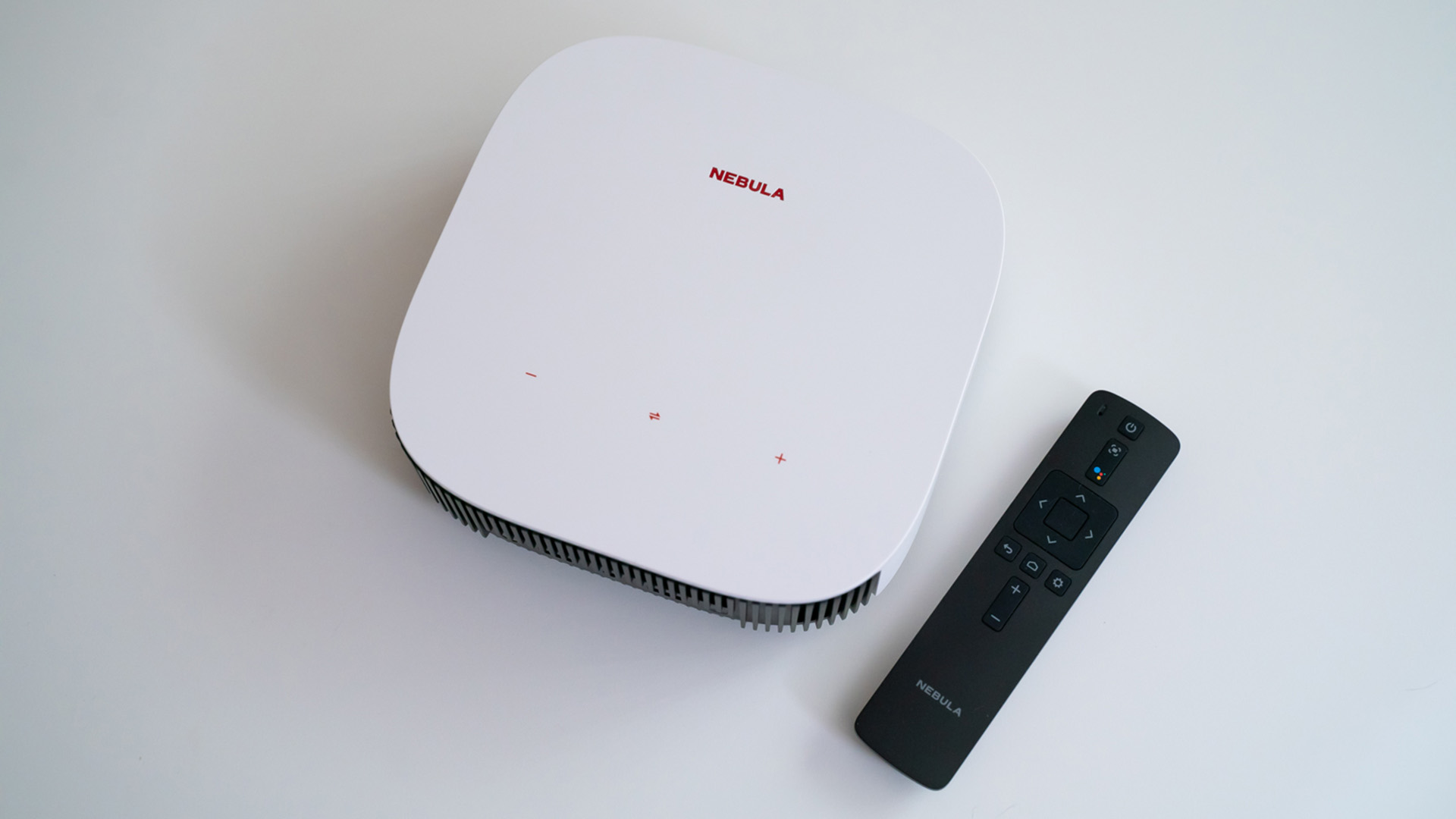
Anker Nebula Solar review: performance
The quad-core AMD A55 chipset and Arm Mali-G31 graphics that power the Nebula Solar are speedy enough for most people. I’ve noticed that this projector isn’t as fast to wake and as snappy as other pricier projectors I’ve tested, but the average user isn’t likely to notice the difference.
Despite its size, it also manages to stay cool and relatively quiet under pressure. There’s noticeable air blowing in the back where the vent is, but it’s warm rather than hot and not as loud as other projectors. That’s something users can appreciate if they’re not using an external speaker and only relying on the device’s built-in ones.
Speaking of which, the audio quality from the Nebula Solar’s two 3W speakers is quite boxy. The the highs are dull and the upper mids are prominent so the voices are a bit louder, but the sound is not balanced at all. Those who love booming bass will be disappointed as there’s no low end here. I even put on The Dark Knight, which has a lot of low end, to see if it’s able to squeeze a little bit out, and there was nothing. There’s no way for you to customize the audio, either. If you want better sounding audio for a better movie-watching experience, you’ll want to connect it to a Bluetooth speaker instead.
When using the Nebula Solar in Bluetooth speaker mode, the audio is mostly a miss. While Vampire Weekend’s “Ottoman” sounds ok – unsurprisingly, since it’s mostly mids – M83’s “Atlantique Sud” sounds compressed, Twin Shadow’s "To the Top” has no bass at all and Taylor Swift’s “Death by a Thousand Cuts” is incredibly thin-sounding.
The good news is that these speakers have decent volume – loud enough that you can hear dialogue clearly over the fans. It also has the tiniest hint of directional audio when you’re sitting directly in front of it.
The Nebula Solar delivers visuals at 1080p resolution and an up to 120-inch image projection. That’s sizable and enough for a medium-sized room. The picture quality is plenty sharp and clean, and you’ll certainly enjoy watching movies and shows on it. The colors are vibrant as well, as long as you’re watching brightly-lit scenes.
However, if you’re picky, the 400 ANSI lumen brightness and dynamic range might disappoint. You won’t see a lot of detail in shadowy scenes, and even something as bright and vibrant as Thor: Ragnarok will feel a bit gloomy.
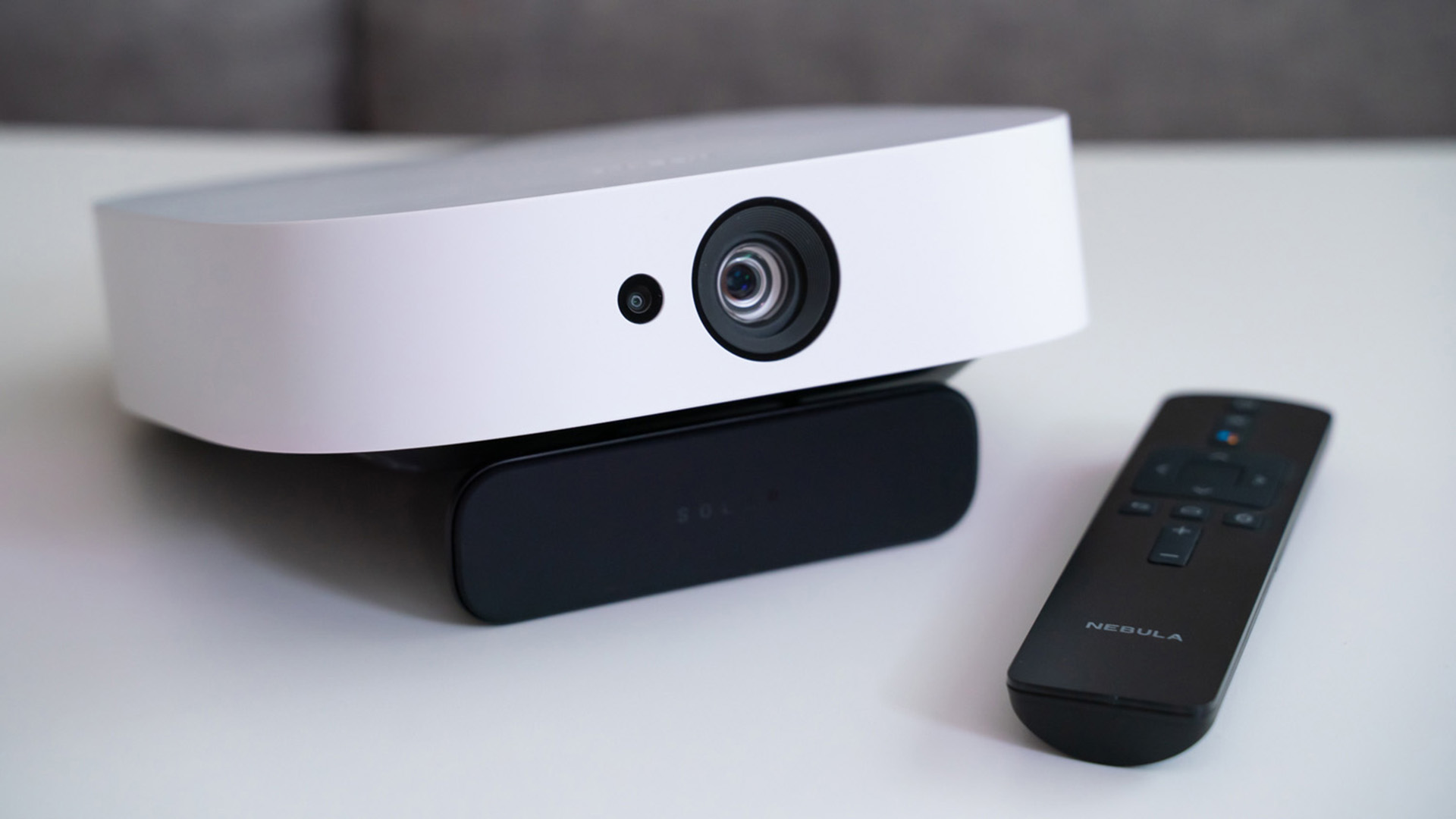
Nebula Solar review: verdict
There’s a lot to love in the Nebula Solar but is it the best mid-range portable projector? Probably not. However, it is among the best value, offering something for folks who don’t want to go all out or just need something that will see them through their streaming needs when a large-screen TV is not possible.
If you’re looking for a portable projector, the Solar Portable which now sells for practically the same money, is a better investment. This offers all the same features as the Nebula Solar with the addition of a rechargeable battery that gives up to three hours of playtime.
Nebula Solar review: also consider
If you need something brighter or with a bigger projected image, the Xgimi Elfin is $649 / £649 / AU$970. At 800 ANSI lumens it has double the brightness of the Solar, a 200-inch image projection and a 3.5mm audio jack for additional speaker connectivity.
If you’re looking for something smaller, the Xgimi MoGo Pro Plus lives up to the hype with its 1080p resolution, built-in battery and a super compact cuboid design. It’s a little more expensive, however, at $699 / £589.

Michelle Rae Uy is a tech and travel journalist, editor and photographer with a bad case of wanderlust. She is a regular contributor for IGN, TechRadar and Business Insider, and has contributed to Thrillist, Paste Magazine, Nylon, Fodor's and Steve's Digicams. Living mainly in California with her adorable cats, she splits her time between Los Angeles, London and the rest of the world.